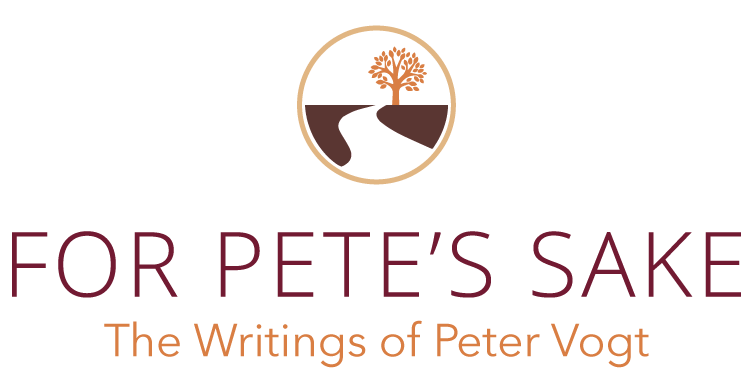Belief Without Certainty Is What True Belief Is All About
Every Wednesday afternoon during my seventh- and eighth-grade years, my junior high school “released” a bunch of us kids as part of a hazy weekly practice called, imaginatively enough, Release Time.
By all rights, this ritual should have taken place one time and one time only at the nearby Tamarac National Wildlife Refuge, where our suffering teachers could have marched us off a school bus, released us into the tick-filled woods, miles from actual civilization (and the authorities), and gleefully watched as a grateful black bear devoured us for all our hormone-driven snottiness and stupidity and shenanigans. Now, that’s a Release Time our teachers could have gotten behind. How middle-school teachers don’t eat their students themselves is beyond me.
But Release Time wasn’t that — though it did involve a school bus. Release Time was simply public school code, circa 1980, for putting us on a bus each Wednesday at 2 p.m., an hour or so before school was supposed to end, and shipping us to our respective small-town Lutheran churches for what was, and still is, called Confirmation.
I would explain what Confirmation was. And still is. But I didn’t understand it. And still don’t.
I do know that it was intended, broadly speaking, to teach us what was right and what wasn’t when it came to religious matters. It was supposed to clear things up, I’m sure. But all it did for me was cloud the already-muddy waters when it comes to belief. Especially true belief, with all its messiness, vs. stated belief, with all its exaggerated clarity and fancy packaging.
I knew I was in trouble at Confirmation early on, when I showed up one day — literally minutes after having left science class back at school — and asked one of the pastors: “Where are the dinosaurs in the Bible?” We had just been talking about dinosaurs; stegosaurus bones were fresh on my mind. I wasn’t trying to be difficult. I screwed around at times like any 12- or 13-year-old, but when it came to asking questions — especially asking questions at Confirmation class — I was as sincere as Linus waiting for the Great Pumpkin.
So seriously, pastor: Did Noah corral a couple of T-Rexes for the ark?
I can’t honestly say how he responded. Maybe he rolled his eyes. Perhaps he took a pained look around the room at the squirrely adolescents he was now stuck with, clapped his hands together, and said, “OK, people, let’s get to work.” I have no idea; I can’t remember.
All I do know is that he didn’t answer my question. Or couldn’t. Or both.
Just another day at the Confirmation office. And at a place tied inextricably to Martin Luther, one of the ultimate questioners of his era.
I had been asking religious puzzlers for years by this point, and I still ask them to this day, relative moments beyond my 49th birthday.
One morning when I was about 10, I cornered my mom after church and, instead of sprinting to the TV to catch the gods I really worshiped at the time — Baron von Raschke and The Crusher and Bobby “The Brain” Heenan and the many other colorful characters of All-Star Wrestling — I asked her about heaven.
“When you get to heaven,” I started, “what age will you be?”
Seeing the confused glaze appearing immediately on my poor mom’s face, I tried to clarify.
“When I see you there, Mom, will you be the age you are now so that you’re still my mom and I’m still your kid? Or will you be a kid again and I’ll be old enough to be your mom — er, dad?”
No wonder the adults around me were always shaking their heads.
“And what will we do there, anyway?” I went on, moving quickly to the other key concerns on my mind thanks to that day’s Sunday School lesson. “If there are no problems there, if there’s no pain and no sorrow and no disappointment — which all sounds very nice — won’t it get boring? Will golf be any fun if I get a hole-in-one every time I hit the ball? Will basketball be any fun if every shot I take goes in? Won’t strumming a harp, as beautiful as it is, get old after a while? What’s heavenly about that?”
Mom didn’t answer my questions. Or couldn’t. Or both.
I have always struggled — as if I’m not doing it right — with matters of pure faith, even though I am not and do not want to be faithless. I actually want to believe the things that are presented to me where faith is concerned, and in terms of the big picture I do. In some ways I’m more faithful than most, I would argue.
But there’s an enormous difference between saying you believe something and really, actually believing it in your heart of hearts. And that difference is driven entirely by understanding — or lack thereof.
Which is why I flunked Confirmation. Or faked it, at any rate.
Too often, especially when it comes to religion, I simply don’t understand what appears to be self-evident to many of the people around me. Over time, I have increasingly worked up the nerve to say so, never intending to communicate anything along the lines of “this is all a bunch of baloney” but instead simply and innocently and genuinely acknowledging: “I don’t get it. Not completely, at least.” Nothing different than I often said in seventh-grade algebra: “Mr. Larson, I don’t get it. Not completely, at least.” I wasn’t saying: “Mr. Larson, I think you and your quadratic formula are a complete crock of shit.” It was only: “Mr. Larson, I don’t understand. Can you help?”
I wish I could have done the same on Confirmation Day when it rolled around. But alas, seeing no other alternative besides mortifying my parents — especially my mom, who was driving the whole religious upbringing operation — in front of our entire church, I stood before everybody, recited the obligatory Bible verse I had memorized (“Let your light so shine …”), and, like the other kids, “confirmed”: I believe. In God, in Jesus, in the Holy Spirit.
But the truth — the truth I couldn’t possibly reveal and live to tell about it (either my mom or God would end me, I reasoned; whoever got to me first … I’d go to Vegas on Mom) — was that I really wanted to say:
“For starters, everyone, I’m 13 years old. One-three. I’m not sure where I misplaced the Clearasil this morning, which explains the giant zit on my forehead right now as I stand before you wearing this ridiculous white gown. Though I have memorized it, I’m not sure what Larson’s quadratic formula actually does. I’m not sure if I’ll survive another day staring at the girl I’ve been in love with from afar since seventh grade began a year and a half ago. Do you seriously expect me to be sure of my Christian faith, or any other faith for that matter, at this age? You tell us to stay away from the drugs. Are you on them?
Followed by:
“Here’s the deal: I don’t understand this stuff. Not all of it, anyway; only that God exists. That makes sense, largely because the alternative does not. I want to understand everything, especially because it seems like everyone else does, which makes me feel stupid. But I just don’t get it. Can you help?”
And then, warmed up and adrenaline surging, I would have cut loose with the religious algebra problem that neither Mr. Larson nor anyone else could possibly solve — the Rubik’s Cube, with all its moving parts, that had been twisting in my mind for almost two years. And is still twisting in it now:
“If I became a child of God when I was baptized — and that much I do get … in fact, I think we’re all children of God from the moment we exist, baptism or not … isn’t that the grace, the gift from God, that we say Martin Luther is talking about, that he risked his own tail to argue in his day? — then what in God’s name is there to confirm at Confirmation, exactly? Did God screw up or something? Do we have to double-check on God? Seriously? We should trust God with our lives, but we can’t trust that He writes these sorts of things down?
“Excuse me: I guess I need to make a phone call:
Me: ‘Pick up, pick up. Good morning, God. This is Your day. I am Your child. Show me Your way. … Oops. Actually, God, as you know, those are lyrics from a song we learned years ago in chapel. Turns out they’re sort of relevant here.
‘Anyway, God: I’m just calling to confirm that you really did accept me as a child of, well, yourself, either at my baptism when I was still whizzing in my pants or even before that, when my dad’s sperm collided with my mom’s egg on that night they both remember uncomfortably clearly. You know, God: You can never be too sure on these things, chapel ditties notwithstanding. So … am I yours? Am I really yours? Can I get a confirmation on that, please?’
God: ‘OMM — oh, my Me. Does anyone listen anymore?'”
I believe — and I always have, during and long before Confirmation — that there is something unfathomably — unfathomably — bigger than us out there somewhere. “God” works just fine for me, but so does “Great Spirit” or “The Universe” or “Source” … or whatever. This entity, contrary to what was portrayed in the pictures I saw growing up, is not a white human male with a beard. If that were true, then perhaps I myself am God; I meet all of the qualifications.
No. Of course not. It’s arrogant and delusional for us humans to think we can even know or understand this entity completely, or that our particular religious bent (or lack thereof) has a corner on the God and heaven market.
So I’m satisfied with simply believing that God exists somehow in some form, that God has my and everyone else’s best interests in mind, and that God is smart — and organized — enough to take care of the rest of the details, without revealing them to me or Martin Luther or Billy Bob Joe down the street or anyone else who thinks they can and should know and fully comprehend.
Isn’t that faithful enough?
In fact, isn’t that faith?
Belief without certainty is what true belief is all about. Belief without certainty is faith. Consider it confirmed. Then let it go and let it be.
It’s release time.

I’m a writer. An essayist, to be more exact. I tell stories here—true stories, from my own life, in hopes they will make a positive difference in yours.
I share laughs and tears, insights and observations, frustrations and realizations, relying all the while on the storytelling wisdom of Julia Cameron, author of The Right to Write.
It is a great paradox that the more personal, focused, and specific your writing becomes, the more universally it communicates.

Think you hit directly on the definition of faith! See Hebrews 11:1 – “Now faith is the assurance of things hoped for, the conviction of things not seen.”
As for confirmation, since Lutherans often baptize babies, confirmation is a rite that allows young people to make their own choice regarding faith. After receiving instruction on what Lutherans believe, young people have the opportunity to commit their life to Christ as a Lutheran. Our church refers to it as “affirmation of baptism”.